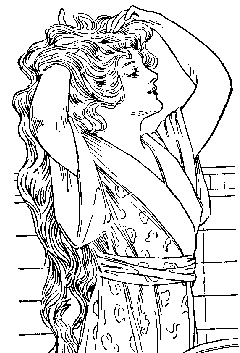Another Trip Down Memory Lane... History and Old Stuff... And What I Think About It...
The following hair care tips are quoted from Household Discoveries and Mrs. Curtis's Cook Book, by Sidney Morse, which was published in 1913 by Success Company's Branch Offices.
Care of the Hair
The proper care of the hair under normal conditions is very simple. The objects to be kept in mind are to preserve its natural luster and texture by means of absolute cleanliness, and to massage the scalp sufficiently to remove any scurf or dandruff that may adhere to it, and thereby promote the active circulation of the blood. All this must be done without injury to the scalp or the hair by pulling, scratching, or tearing...
Professional hairdressers do not advocate shampooing the hair oftener than once a month. A thorough brushing once or twice a week is regarded by them as sufficient for cleanliness and as much more beneficial for the hair and scalp...
The general opinion is that it is feasible to brush the hair free from dust each night before retiring. Applications of tonics and restoratives should also be made at this time as they have the best opportunity of doing their work during sleep and especially while the blood is circulating freely as the result of brushing.
The care of the hair must be governed by common sense and general rules must be adapted to individual conditions. Some persons find it necessary to wash the hair as often as twice a month and with others once a month is sufficient. When the hair is oily it should not be brushed as freely or frequently as otherwise. When it is dry and harsh, the application of lanolin or other pomades may be necessary.
An analogy may be found in the grooming of horses. Every good groom knows by experience that plenty of combing and brushing not only produces a fine coat but promotes the health and vitality of the animal. Hence brushes with moderately stiff bristles should be chosen.
For men the so-called military or broad double brushes, one for each hand, are to be preferred.
To Dry-clean the Hair
To thoroughly cleanse the hair it should be brushed successively from partings made in all directions upon the scalp, the utmost care being taken that foreign matter accumulated on the brush is removed and not returned by the next stroke to the hair.
Professional hairdressers when giving the hair a dry cleaning run a comb through the brush each time the latter is drawn through the hair, and afterwards wipe the comb clean on a towel. The object of this process is to remove dirt and dandruff and bring about the additional softness resulting from perfect cleanliness. If this is not done, the natural oil of the hair mixing with foreign substances merely makes the hair sticky.
Sidney Morse, Household Discoveries and Mrs Curtis's Cookbook. (Petersburg, NY: Success Company's Branch Offices, 1913), pp. 584-585.
 Later in the same chapter, the authors mention that dandruff is a widespread problem and give half a dozen home remedies. Some of the ingredients in the various treatments include sulfur, carbolic acid, quicklime, and borax.
Later in the same chapter, the authors mention that dandruff is a widespread problem and give half a dozen home remedies. Some of the ingredients in the various treatments include sulfur, carbolic acid, quicklime, and borax.Somehow it doesn't surprise me that dandruff was a problem!
Related post: Could you survive without shampoo?
Technorati tags:
1 comment:
That's right in line with what the Head Massage video said -- that it would aid in circulation which would in turn help keep the scalp and hair healthy-looking. I guess they kind of know what they're talking about! Go figure!
Post a Comment